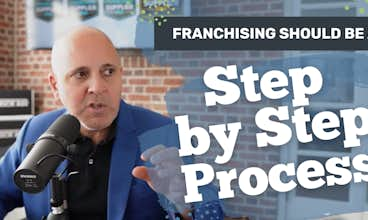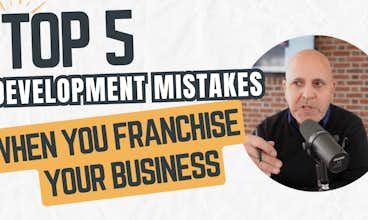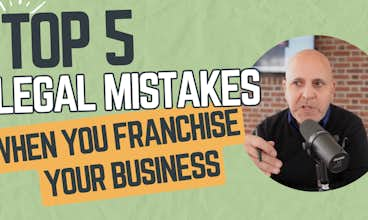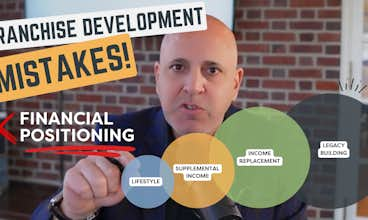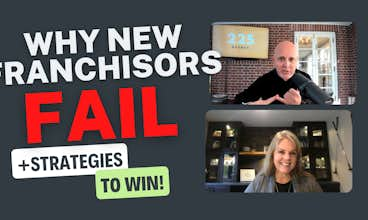Are you thinking about franchising your business and recruiting franchisees to develop and open new locations using your brand and following your systems?
If franchising is something that you are considering, then it’s important to understand the risks and rewards of franchising a business.
Rewards of Franchising a Business include:
Multi-Unit Expansion
Increased Revenue Streams
Economies of Scale
Leverage and Capitalization
Risks of Franchising a Business include:
Regulatory Risk
Capital Requirements
Selling Franchises is Not Easy
Beware of Franchise Vultures
Read on to learn about the benefits and risks of franchising a business – and get expert tips for franchising your business the right way.
Franchising Rewards
When it comes to franchising a business, the rewards can be plentiful. From brand recognition and scalability on a national level to increased revenue and capitalization options, franchising can take your business to the next level in unique – and profitable – ways. Below, we’ll discuss the key rewards that many franchisors experience after franchising their business.
Franchising Reward No. 1: Multi-Unit Expansion
Franchising is a business and legal model that allows you, as a franchisor, to expand and grow your business. When done correctly, franchising allows you to achieve the expansion of your business and brand through the recruitment and qualification of franchisee partners. Franchising allows you to accelerate growth through the sale of franchise units throughout your preferred region – or even across the globe.
“In franchising, the greatest reward is that the franchise business model gives entrepreneurs and successful small business owners the opportunity to sizably grow their businesses. It’s almost a David and Goliath – by adopting a franchise business model, small business owners have the opportunity to grow their businesses and outmaneuver larger national corporate brands,” says Charles N. Internicola, a franchise attorney with over 25 years of experience in the industry and the founder of The Internicola Law Firm.
For many franchise founders, one of the most rewarding experiences is seeing the buyers of those units – called franchisees – succeed as business owners while growing their franchise system.
“Good franchisors change lives and are passionate about their business, their team members, and, when they become a franchisor, their franchisee partners. When done correctly, when you franchise your business and sell franchises you are influencing the lives of your new franchisee partners and providing them with the opportunity to replicate and build a business that, hopefully, will improve the lives of your franchisees and their families,” Internicola says.
Franchising Reward No. 2: Revenue
As a franchisor, you will benefit from an expanding and diversified revenue stream. That is, as your franchisees establish their own franchised locations, you will start generating recurring revenues in the form of royalties.
“[Opening new locations] creates scalability and, with every new location that opens, so does new revenue opportunities for the franchisor. As a franchisor, your revenue stream is built on royalties and supply chain revenues generated by your franchisees and their franchised business locations,” Internicola says.
For franchisors, one of the key benefits of expanding revenue streams is that it can help you overcome the limitations and challenges of running a business – and empower you to reinvest in other critical parts of your franchise system.
“Franchising is all about scalability and accelerated growth. Every good business owner experiences limitations, in one form or another, as to how many locations they can organically open and manage. Whether it’s limitations on qualified management, team members or capital needed to continuously invest in new locations, franchising creates scalability. Franchisee partners invest their own capital and devote their managerial efforts to opening new locations,” Internicola says.
Franchising Reward No. 3: Economies of Scale
As your franchisees expand, so will your ability to generate more negotiating power and economies of scale with key suppliers. Depending on how your franchise system is structured, franchisees might also contribute to marketing and brand development funds that will allow you to better promote and expand your brand with consumers.
Franchisors can develop economies of scale by building supply chains that generate revenue and offer franchisees better prices, along with developing training and marketing systems that empower franchisees to outperform the competition and increase profit margins while supporting year-over-year growth. By using economies of scale to over-support early franchisees as a startup franchisor, you can also create long-term success for your brand.
“The success of a franchise system is tied to the success of its franchisees. Franchise systems grow and thrive when franchisees succeed, grow revenues, increase profitability and enjoy operational success. Franchisors should be focused on investing and reinvesting in the systems and support needed to help franchisees succeed,” Internicola says.
Franchising Reward No. 4: Leverage and Capitalization
As a franchisor, you will leverage and monetize the value of your brand, business systems and know-how. Rather than just serving your corporate location, these assets will be used by your franchisees who will contribute their capital and managerial efforts to expanding their franchised locations – and your brand.
To make sure your brand’s intellectual property is properly protected – and therefore eligible to be capitalized – it’s important to register your trademarks with the U.S. Patent and Trademark Office as early as possible in the franchising process.
“From there, protection comes down to monitoring and policing your trademarks and IP by making sure your legal team is tracking your trademark registrations and filing the appropriate maintenance filings and by policing your marks by sending legal notices to competitors that may be using trademarks and trade dress that is confusingly similar to your brand,” Internicola says.
Franchising Risks
Although franchising can offer a wide variety of benefits for successful entrepreneurs seeking new opportunities to grow their business, it also has risks. As a highly regulated industry governed by highly specific laws at the federal and local state levels, it’s important to make sure your business is ready before franchising.
Franchising Risk No. 1: Regulatory Risk
As a startup franchisor, you must ensure that you comply with franchise laws before offering or selling franchises. Once you’re compliant with state and federal franchise laws, there are many advantages to franchising – but if you don't do it correctly, legal and regulatory risks can include steep fines, penalties, and even the loss of your franchise system in more serious cases. To learn more about franchise laws, click here.
According to Internicola, one of the most common mistakes startup franchisors make is adopting a licensing model as an alternative to franchising to save money. Although this tactic is often suggested by questionable franchise development companies as part of an all-in-one franchising service, it often violates federal franchise regulations.
“Licensing is not an alternative to franchising. The reason is that federal and state regulators understand that entrepreneurs may attempt to avoid franchise regulation through a licensing model and, in response, the regulators have broadly defined what creates a franchise relationship so that licensing alternatives will almost always trigger franchise regulation,” Internicola explains.
To ensure you’re in good hands when franchising your business, work with a team that helps you understand the legal and financial responsibilities of founding and maintaining a franchise system – including the costs associated with selling franchises – before signing a contract or paying a fee.
“Make sure you build a direct relationship with a franchise legal team that you select on your own and a team that will be with you every step of the way. Avoid one-stop-shops. They are not one-stop – and the stop they take you to is not a pathway for franchise success,” Internicola says.
Franchising Risk No. 2: Requires Capital
Like every other business expansion model, franchising requires capital and financial investment in developing a franchise system and satisfying your regulatory obligations. Unfortunately, there are no shortcuts to franchising. More often than not, any perceived shortcut will lead you to franchising risk No. 1 – that is, facing steep fines and legal penalties for regulatory violations.
“[The] most common reasons new franchisors fail is they are undercapitalized and they don’t have the right mindset and understanding of what franchise success looks like and the game plan to get there,” Internicola says.
To mitigate those risks, Internicola recommends organically growing and seasoning a franchise offering while avoiding some of the more common missteps made by startup franchisors, including the following:
Starting a franchise with only enough capital to franchise your business but not enough to sell franchises or support franchisees.
Under-spending in the franchise development process and developing legal, business and sales documents, such as the Franchise Disclosure Document, operations manual and franchise sales website, that don't meet best practices and provide no competitive advantage.
Expecting to become profitable as a franchisor within the first several years in business.
Because royalty sufficiency (when the costs of a franchise system are covered by royalties) can take years to achieve, Internicola advises startup franchisors to be prepared to invest and reinvest in their franchise system over time, particularly focusing on franchise sales and franchisee support.
“The good thing is that franchising is scalable and even with mild and limited budgets – provided that you have the right mindset and gameplan – you can succeed as a franchisor. From a mindset and planning perspective, it’s important to understand that it takes time to season and scale a franchise system,” Internicola says.
As a new franchisor, you should expect to spend your first year building and improving the organic reach of your brand by focusing on customers, personal contacts and social media to recruit your first franchisees.
“In your first year or even two, focus on recruiting and onboarding a limited number of franchises. Your initial franchisees – their experiences, their success and their satisfaction – will determine whether or not your franchise will succeed. So years one and two are all about building a foundation, and years three to five are all about accelerating growth,” Internicola says.
Franchising Risk No. 3: Selling Franchises is Not Easy
Just because you’ve franchised your business doesn't mean that you should expect to automatically sell franchises. The process of franchising your business involves more than just the preparation of your FDD – it requires a thoughtful development process focused on your business and your goals.
“As a new franchisor, you need to understand that early on in your first and second year of franchising, you must be building and refining your franchise offering – who you are, the value you bring, the support you provide, the advantage that your franchisees experience and your overall franchise brand story,” Internicola says.
Instead, Internicola advises new franchisors to focus on organic growth and selling their first three franchises to franchisees that know – and are passionate about – your brand while over-supporting their success as a franchisor. Beyond franchise sales, educating yourself about the industry is also critical for long-term success as a franchisor.
“Scalability and growth take time and, as a franchise founder, it's important to join communities and learn about franchising,” Internicola says.
Franchising Risk No. 4: Beware of the Franchise Vultures
“One of the most difficult conversations I experience is from business owners who believe they properly franchised their business and contact our firm for advice because franchising doesn’t seem to be working for them. Turns out, they worked with a franchise development company that promised them everything – legal, franchise development, operations manuals, franchise sales support – and turns out they did not get much of anything [besides] legal advice provided by non-lawyers, an FDD that doesn’t meet standards, an operations manual that doesn’t work, and no real plan for franchise sales,” Internicola says.
Often, those entrepreneurs have utilized something known in the industry as “one-stop shops.” These franchise development firms can include a variety of vendors ranging from advertising companies to SEO providers, franchise attorneys, PR companies, so-called franchise development companies, and other types of businesses selling bundles of “expert services” to prospective franchisors. Unfortunately, those services are often offered in bad faith to entrepreneurs eager to scale their businesses.
“We receive calls all the time from ‘new franchisors’ who worked with a one-stop-shop, have their so-called FDD but don’t have any money to invest in the franchise sales process. What’s worse, many times these business owners were not yet ready for franchising,” Internicola says.
Some of the biggest red flags aspiring franchisors should be on the lookout for when dealing with a “one-stop shop” include the following:
One-stop shops that claim to do everything – including offering legal representation that should be exclusively between you and your franchise lawyer – for one fixed fee.
Franchise developers that make franchise sales sound easy. Often, this involves a sales pitch promising to help you sell franchises after you franchise your business.
Franchise developers that don’t help you understand how much money you will need to invest in selling franchises once your FDD is issued. This should be discussed before you sign a contract with them or pay a fee.
Internicola advises aspiring franchisors to ask questions when working with new consultants, making sure your franchise development goals are realistic and achievable with your resources. You should also make sure to ask for client referrals – something that can help you gauge the level of transparency offered by the company.
Despite the risks, the rewards of franchising a business – when done properly and approached with the right mindset – can make the process worth it. From achieving a lifestyle you love to expanding your revenue streams and improving the lives of your franchisees, founding a franchise system can offer franchisors unique benefits that exceed those of simply owning a business.
“Franchising is an amazing business model that helps entrepreneurs grow amazing life-changing businesses. But franchise success takes time and requires that you, as a founder or as a part of a leadership team, take the time to learn franchising and work with the right team,” Internicola says.


